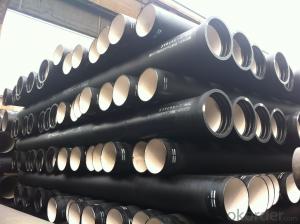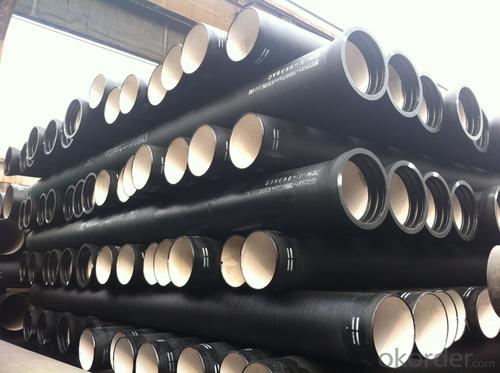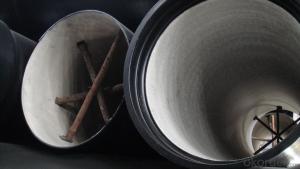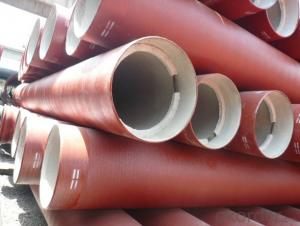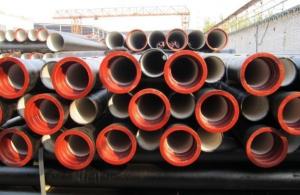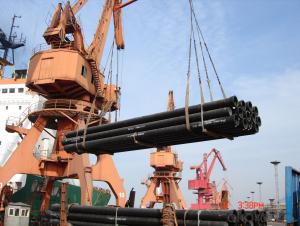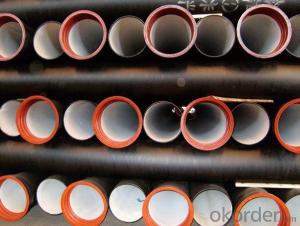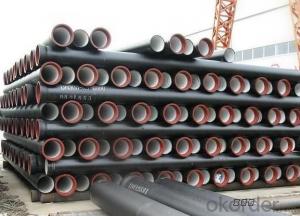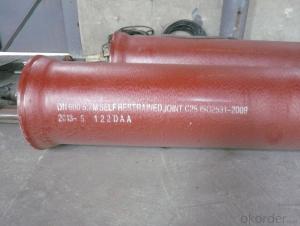Ductile Iron Pipe DN100-DN900 EN545/EN598/ISO2531 C30
- Loading Port:
- China main port
- Payment Terms:
- TT or LC
- Min Order Qty:
- 20 m.t.
- Supply Capability:
- 200000 m.t./month
OKorder Service Pledge
OKorder Financial Service
You Might Also Like
1.Ductile Iron Pipe Description :
DI pipe fittings are manufactured according to ISO 2531 or BS EN545 or BS4772 FOR POTABLE WATER ,internal is cement lining or wet epoxy coating;External is zinc plus bitumen or wet epoxy coating.Pipes confirm to ISO2531,K9 class,T type joint,6m long,with inside cements lining conform to ISO4179, outside Zinc spraying(130g/m2) and bitumen coating(70μm) conform to ISO8179.Pipe ends: Spigot and socket ends, with 100% SBR rubber gaskets accoding to ISO4633.We can do third party inspection according to customer's request.
2.Main Features of the Ductile Iron Pipe:
1. Material: Ductile iron grade 500-7/ 450-10 in accordance with ISO1083
2. Standard: ISO 2531, EN545, EN598, ANSI, AWWA
3. Length: 6m or cut into 5.6m, 5.7m, 5.8m
4. Internal Lining: Cement, conform to ISO4179
5. External coating: Zinc + Bitumen, conform to ISO8179
6. Certificate: ISO9001, ISO14001, SGS, NSF, WRAS
7. Test: In accordance with ISO 2531 / EN 545 / EN598 and 100% water pressure test
3.Ductile Iron Pipe Images:
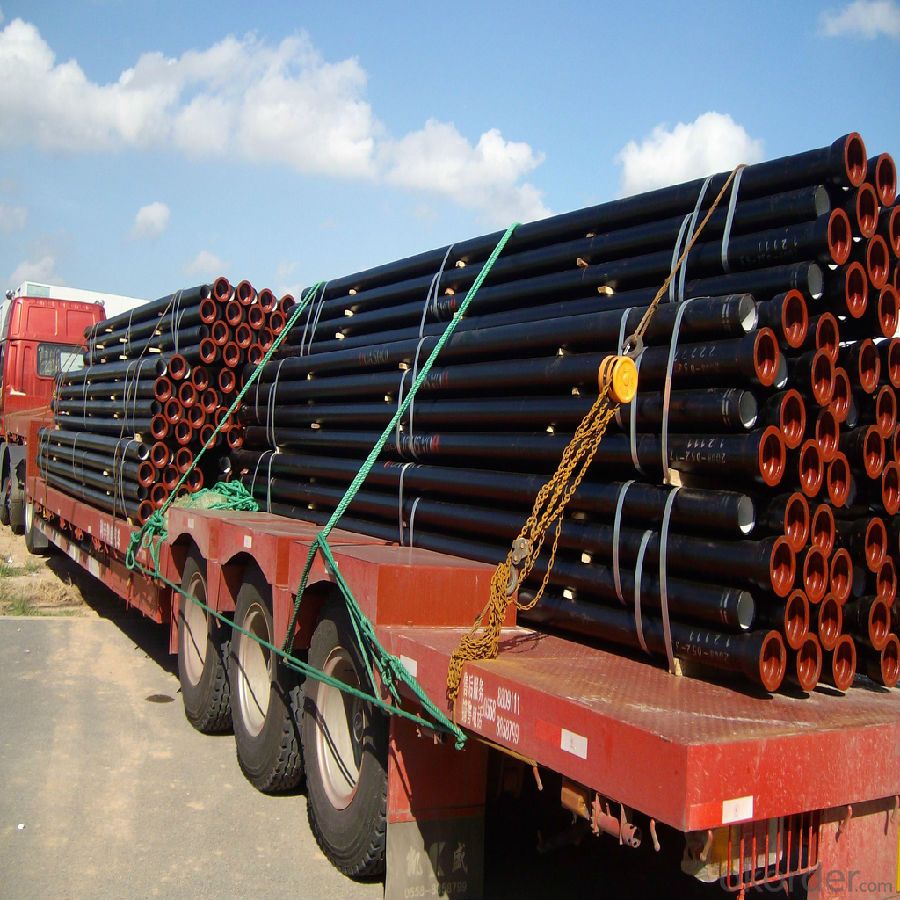
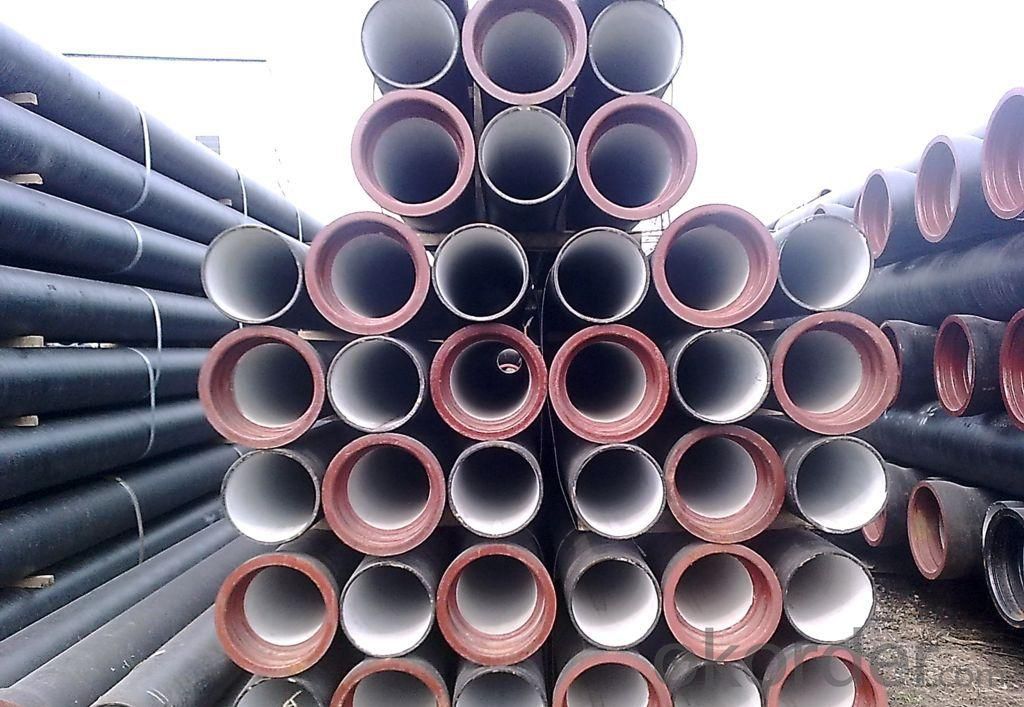
4.Ductile Iron Pipe Specification:
Standard: API SPEC 5L 44th eidtion,ASTM A252-98(2007)
Grade: A53 Grades A/B, ASTM A106 Grades B/C,ASTM A179
AWWA, C200, ASTM A139, ASTM A120, API 5L Grade B
Weld Alternatives: LSAW
OD size range: 6.4~44.5mm
Wall thickness: 406.4~1422mm
5.FAQ:
1.Q:Why can you guarantee the inner of pipes can’t be corroded?
A: High alumina cement mortar lining and sulphate-resistant cement mortar lining. These two special linings are applicable to inner anti-corrosion for sewage pipes, improving resistance to erosion of the sewage components.
2.Q: Why would you choose ductile iron pipe rather than other pipe materials?
A:The reasons are obvious for that not only ductile iron pipe possesses the inherent strength and flexibility of ductile iron, combined with proven corrosion protection systems, but also the cost savings can be achieved from design to installation and commissioning.
- Q: What's the difference between cast iron pipe and steel pipe?
- Steel tube (Steel pipe) production technology development began in the bicycle manufacturing industry, the rise of the early nineteenth Century during the oil development, the two world war ships, boilers, aircraft manufacturing, manufacturing of power boiler after the Second World War, the development of chemical industry of petroleum and natural gas drilling and transportation, will effectively promote the the yield and quality of varieties, the development of steel tube industry.
- Q: Are ductile iron pipes suitable for installation in areas with high soil compaction?
- Yes, ductile iron pipes are suitable for installation in areas with high soil compaction. Ductile iron pipes have high strength and durability, allowing them to withstand the pressure exerted by compacted soil. They can effectively resist external loads and provide long-term performance, making them a reliable choice for such areas.
- Q: How are ductile iron pipes transported and stored?
- Ductile iron pipes are typically transported and stored in a systematic and careful manner to ensure their safety and integrity. Transportation of ductile iron pipes usually involves the use of specialized vehicles, such as flatbed trucks or trailers, that are capable of accommodating the size and weight of the pipes. These vehicles are equipped with appropriate securing mechanisms to prevent any movement or damage during transit. The pipes are loaded onto the vehicles using forklifts or cranes, ensuring that they are properly supported and balanced to avoid any bending or deformation. During transportation, it is crucial to protect the pipes from external factors that could potentially cause damage. This includes placing covers or wraps over the pipes to shield them from adverse weather conditions, such as rain, snow, or excessive sunlight. Additionally, securing the pipes with straps or chains can prevent any shifting or rolling during transit. When it comes to storage, ductile iron pipes are typically stacked on specially designed racks or supports in a horizontal position. This allows for even weight distribution and minimizes the risk of deformation or stress on the pipes. The storage area should be clean, dry, and well-ventilated to prevent corrosion or deterioration. It is important to handle ductile iron pipes with care to avoid any impact or rough handling that could result in cracks or fractures. Workers involved in the transportation and storage process should be adequately trained to ensure they follow proper protocols and use the necessary equipment, such as lifting machinery and protective gear. Regular inspection of transported and stored ductile iron pipes is essential to identify any signs of damage or corrosion. This allows for timely repairs or replacements, preventing any potential issues when the pipes are installed for their intended use. Overall, the transportation and storage of ductile iron pipes require careful planning, proper equipment, and adherence to safety protocols to ensure their condition and performance are maintained.
- Q: Are ductile iron pipes suitable for sewer force mains?
- Sewer force mains can indeed make use of ductile iron pipes. Ductile iron, a variant of cast iron, possesses a higher degree of strength and flexibility in comparison to conventional cast iron pipes. This quality renders it suitable for applications where pipes must endure high pressure and heavy loads, such as sewer force mains. Ductile iron pipes exhibit exceptional resistance against corrosion and boast impressive durability, which proves vital for sewer systems that face exposure to various corrosive substances and challenging environments. Moreover, these pipes possess the ability to absorb vibrations and shocks, thereby reducing the risk of pipe failures caused by external forces. Furthermore, ductile iron pipes possess a renowned reputation for their lengthy service life, frequently extending beyond 100 years. As a result, they constitute a cost-effective choice for sewer force mains, necessitating minimal maintenance and replacement throughout their lifespan. In conclusion, ductile iron pipes offer a dependable and long-lasting solution for sewer force mains, delivering the requisite strength, flexibility, and resistance to corrosion to ensure the efficiency and durability of sewer systems.
- Q: How can the connection of ductile iron pipe elbow be convenient for connecting?
- Ductile cast iron pipe in the groove pipe connection technology is also called the lathedog connection technology, has become the most liquid and gas pipeline connection technology, although this technology is later than foreign in domestic development time, but because of its advanced technology, domestic market quickly received. Since 1998, it has been developed and applied in just a few years. It has gradually replaced two traditional ways of pipe connection, such as flange and welding. Not only technically more mature, the market is generally recognized, but also by the national laws and regulations actively guide the policy. The application of grooved pipe connection technology makes the complex pipe connection procedure simple, fast and convenient. Took a big step forward in pipeline connection technology.
- Q: Are ductile iron pipes suitable for underground installations?
- Ductile iron pipes are well-suited for underground installations. They are made from a highly sturdy and durable material that can handle the various pressures and strains commonly found in underground environments. Moreover, they possess exceptional resistance to corrosion, which makes them an excellent choice for underground applications that might expose them to moisture, soil, and other corrosive elements. Additionally, these pipes have a high tensile strength, enabling them to withstand external loads and prevent cracking or breakage caused by ground movement or heavy traffic. Furthermore, ductile iron pipes have a longer lifespan compared to other materials, making them a cost-effective option for underground installations. On the whole, ductile iron pipes are a dependable and appropriate choice for underground applications because of their durability, corrosion resistance, and long-term performance.
- Q: How many casting methods are there in ductile iron casting? A 60*6 discus can not have sand holes. Its surface is smooth. What process can be used to make it?
- The metal mould is ok! The surface quality of the casting is better than that of the sand mold. But later heat treatment is needed.
- Q: What is the expected corrosion rate of ductile iron pipes?
- The expected corrosion rate of ductile iron pipes can vary depending on several factors, including the specific environment in which the pipes are installed, the pH and composition of the water or soil they come into contact with, and the presence of any corrosive substances or chemicals. In general, ductile iron pipes are known for their excellent resistance to corrosion compared to other materials such as cast iron or steel. This is due to the presence of a protective layer called a passive film, which forms naturally on the surface of the pipes when exposed to oxygen in the environment. This passive film acts as a barrier, preventing further corrosion from occurring. However, it is important to note that even ductile iron pipes can experience some level of corrosion over time, especially in aggressive or highly corrosive environments. The expected corrosion rate can range from very low to moderate, depending on the aforementioned factors. To ensure the longevity and performance of ductile iron pipes, it is recommended to implement proper maintenance and monitoring practices. This includes regular inspections, cleaning, and the application of protective coatings or linings when necessary. Additionally, implementing a cathodic protection system can further enhance the corrosion resistance of the pipes. Ultimately, it is important to consult with experts and professionals in the field of corrosion and pipe materials to accurately determine the expected corrosion rate of ductile iron pipes in a specific application or environment.
- Q: Are ductile iron pipes suitable for use in oil refineries?
- Ductile iron pipes are an excellent choice for oil refineries as they offer a unique combination of strength, durability, and flexibility. These pipes possess high tensile strength, enabling them to withstand the intense pressure and stress commonly encountered in oil refining. Their ability to transport fluids such as crude oil, refined petroleum products, and chemicals within the refinery is crucial. Furthermore, ductile iron pipes exhibit exceptional corrosion resistance, protecting them from the corrosive effects of oil, chemicals, and other substances present in oil refineries. This quality ensures the pipes' longevity and reliability, reducing the need for frequent maintenance and replacement. Moreover, ductile iron pipes possess remarkable ductility, enabling them to absorb significant impacts and vibrations without fracturing or breaking. This characteristic proves advantageous in oil refineries, considering the potential movement or stressors caused by machinery, equipment, or ground settlement. Additionally, the pipes' smooth interior surface minimizes friction, facilitating efficient fluid flow and reducing pressure loss. This feature plays a vital role in optimizing fluid transportation within oil refineries, ensuring a smooth and reliable production process. In summary, ductile iron pipes are well-suited for oil refineries due to their high tensile strength, corrosion resistance, ductility, and smooth interior surface. These pipes provide a trustworthy and long-lasting solution for fluid transportation within the refinery, contributing to the efficient and safe operation of oil refining processes.
- Q: Can ductile iron pipes be used for irrigation systems in agricultural fields?
- Ductile iron pipes are indeed suitable for use in agricultural fields for irrigation systems. Their durability, strength, and corrosion resistance are well-known, making them an excellent choice for a variety of applications, including irrigation systems. These pipes can withstand high pressures and effectively transport water for irrigation purposes. Moreover, the ductile iron material is resistant to various environmental factors like UV rays, soil chemicals, and temperature changes, ensuring that the pipes have a long lifespan. Additionally, ductile iron pipes exhibit excellent flow characteristics, enabling efficient water distribution across the agricultural fields. In summary, ductile iron pipes offer a reliable and sturdy option for irrigation systems in agricultural fields, delivering a sustainable and efficient solution for water distribution.
Send your message to us
Ductile Iron Pipe DN100-DN900 EN545/EN598/ISO2531 C30
- Loading Port:
- China main port
- Payment Terms:
- TT or LC
- Min Order Qty:
- 20 m.t.
- Supply Capability:
- 200000 m.t./month
OKorder Service Pledge
OKorder Financial Service
Similar products
Hot products
Hot Searches
Related keywords
